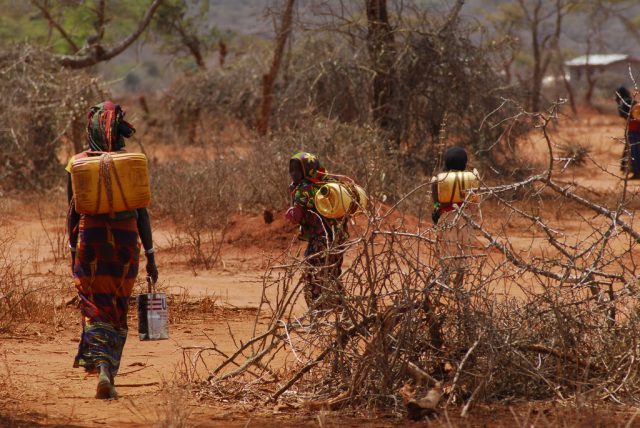
You’re living in Sub-Saharan Africa during a drought entering its second year. The diminished harvests have left you without enough food, and your family is trying to figure out how to get by. You’ve settled on selling some of your livestock and securing a small loan to help cover the cost of food, confident that you’ll be able to recover quickly and repay your debt.
Some of your friends, however, have less wealth than you. If they sell their last two cattle, it could be a long time before they could afford to replace them. And given that their annual income is highly variable, they can’t risk taking out a loan they may not be able to pay back. So rather than dig themselves into a potentially inescapable hole, they eat less and go hungry. Some of those families have growing children, but they see no other way.
In situations like these, those in poverty can be significantly more vulnerable than their wealthier counterparts. When you have little, your flexibility to deal with unpredictable crises is limited.
The last Intergovernmental Panel on Climate Change report, in 2007, recognized the fact that those in poverty around the world would suffer a disproportionate share of many climate change impacts, but it didn’t dig much deeper. The new report devotes an entire chapter to research on how climate change will interact with the realities of poverty.
Poverty isn’t just about income, though that’s the most common metric. Social inequality (along ethnic, class, or gender lines, for example) can make certain segments of a population similarly vulnerable. But economically, about 1.2 billion people fall below the International Poverty Line of $1.25/day. Another estimate based on factors like access to schooling and clean water puts the number at more like 1.7 billion.
There are a great many problems these people might face, like disease, war, scarce employment, social discrimination, and unstable governments. The report describes climate change as a “threat multiplier” capable of adding stress that exacerbates other hardships.
Weather trends can force agricultural shifts, like trading crops for livestock in areas where rainfall is decreasing. Some may try to pick up employment on the side or even give up on farming entirely. And weather extremes, of course, have major agricultural impacts. A poor harvest can raise food prices at the same time that it puts agricultural laborers out of work. The more unpredictable next year’s yields are, the less risk a poor farmer can afford to take. That can mean sticking with meager but dependable options rather than taking a chance on something that could significantly boost income.
Heat waves can also limit the productivity of laborers (aside from the health consequences). Reductions in income, for this or other reasons, can mean pulling children out of school, foregoing medical care, or inadequate nutrition—all of which can bring even more problems in the future.
Floods from extreme rainfall events frequently have a bigger impact on the urban poor in some regions, who are unlikely to have insurance but often live in the most vulnerable part of a city. That’s true for areas susceptible to landslides triggered by heavy rains as well, the report says.
Sea level rise, while considerably less sudden than a flash flood, also threatens many poor, low-lying coastal areas and islands. More than 175 million people live on the Ganges-Brahmaputra and Mekong River deltas, for example, where large amounts of food are grown. Rising sea level means worse flooding, invading saltwater, and a loss of land, displacing many and eliminating their livelihoods.
For those who depend on fish and other seafood, climate change and ocean acidification add additional threats to marine and freshwater resources. Climatic changes affecting Africa’s great Lake Tanganyika, for example, have contributed to declining catches.
Can we mitigate the impact?
It’s not just the impacts of climate change that can be uneven; it's the responses, too. Just as the poor can lack the necessary flexibility to deal with hardship, some helpful adaptations, like diversifying sources of income or obtaining crop insurance, can be out of their reach as well.
Some schemes to help mitigate climate change have eyed the poverty bird with stone in hand. For example, one program encourages developed nations to offset some of their greenhouse emissions by investing in sustainable development projects like clean energy for poor communities. A review of 114 of these projects found that less than 10 percent of them actually helped reduce poverty.
The production of biofuels has also been viewed as a potential boon for the poor, providing jobs and economic development in some regions. But the biofuel rush has resulted in many poor farmers having their small plots of farmland bought out by large (often international) entities, pushing them onto less-productive land. The switch from food crops to biofuel crops has impacted food prices in those areas (though it’s unclear by how much). That, of course, is hardest on the poor—especially the urban poor who spend most of their income on food.
Despite mixed returns so far, the report concludes that proper implementation of these and other initiatives does hold real potential for helping the poor while also taking on climate change. In fact, it’s critical that we do both. “Neither alleviating poverty nor decreasing vulnerabilities to climate change can be achieved unless entrenched inequalities are reduced,” the report states.
Because of its threat-multiplying nature in addition to its direct impacts, climate change will make it even more difficult to reduce global poverty. The asymmetry of impacts leads to tension between smaller, poorer nations—who are less responsible for climate change—and larger, wealthier countries in international talks. While developed nations drag their feet on cutting emissions, developing nations are demanding funds to help them deal with the consequences.
reader comments
77